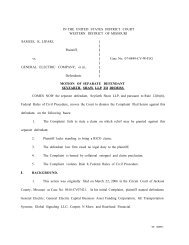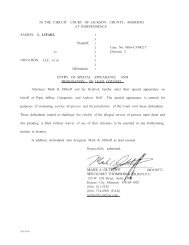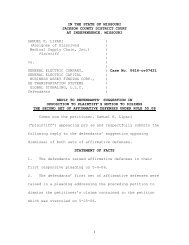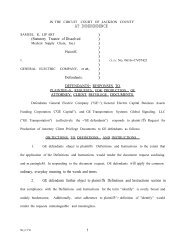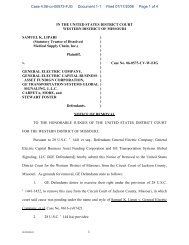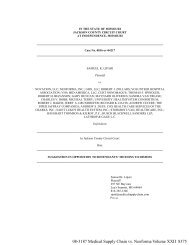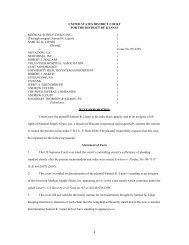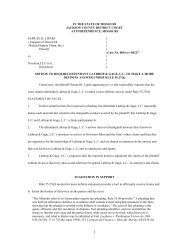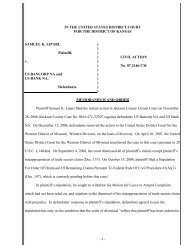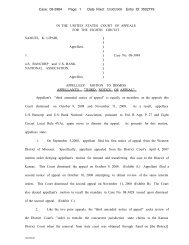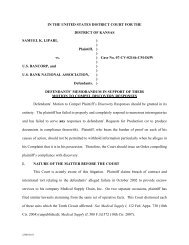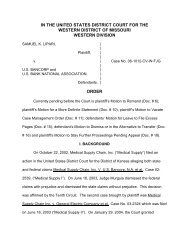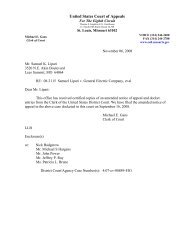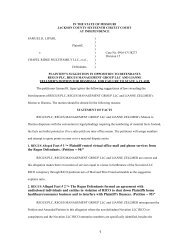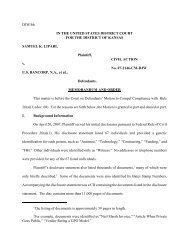Lipari Reply to US Bancorp NA Removal - Medical Supply Chain
Lipari Reply to US Bancorp NA Removal - Medical Supply Chain
Lipari Reply to US Bancorp NA Removal - Medical Supply Chain
Create successful ePaper yourself
Turn your PDF publications into a flip-book with our unique Google optimized e-Paper software.
UNITED STATES DISTRICT COURT<br />
FOR THE WESTERN DISTRICT OF MISSOURI<br />
KANSAS CITY, MISSOURI<br />
SAMUEL K. LIPARI )<br />
(Assignee of Dissolved )<br />
<strong>Medical</strong> <strong>Supply</strong> <strong>Chain</strong>, Inc.) )<br />
Plaintiff<br />
) Case No. 06-1012-CV-W-FJG<br />
) State Court No. 0616-CV32307<br />
)<br />
vs. ) (Properly Case No. 05-0210-<br />
) CV-W-ODS )<br />
<strong>US</strong> BANCORP, <strong>NA</strong> )<br />
<strong>US</strong> BANK, <strong>NA</strong> )<br />
Defendants )<br />
REPLY TO NOTICE OF REMOVAL AND MOTION<br />
TO REMAND THE MATTER TO STATE COURT ON GROUNDS THAT<br />
THE REMOVAL LACKED JURISDICTION UNDER SECTION 1441 et seq<br />
Comes now the plaintiff Samuel K. <strong>Lipari</strong>, the assignee of the dissolved Missouri corporation<br />
<strong>Medical</strong> <strong>Supply</strong> <strong>Chain</strong>, Inc., appearing pro se and makes the following reply <strong>to</strong> the defendants <strong>US</strong> <strong>Bancorp</strong><br />
<strong>NA</strong> and <strong>US</strong> Bank, <strong>NA</strong>’s notice of removal in a timely motion for remand under 28 U.S.C. Sec. 1447(c).<br />
SUMMARY OF REASON FOR REMAND<br />
The plaintiff respectively calls attention <strong>to</strong> the court that the plaintiff’s claims removed from<br />
Missouri State Court by defendants <strong>US</strong> <strong>Bancorp</strong>, <strong>NA</strong> and <strong>US</strong> Bank, <strong>NA</strong> are supplemental state law based<br />
claims originally filed in this court as <strong>Medical</strong> <strong>Supply</strong> <strong>Chain</strong>, Inc. v. Neoforma, et al., Case No. 05-0210-<br />
CV-W-ODS, now Kansas District Court Case No. 05-2299-CM. The Kansas District Court has continuing<br />
supplemental jurisdiction under 28 U.S.C. § 1367(a) and the court’s current order (Doc 78 Filed<br />
03/07/2006) declining federal jurisdiction was not objected <strong>to</strong> or appealed by the defendants.<br />
STATEMENT OF FACTS<br />
1. The state law claims that comprise the current state action were the supplemental state law<br />
claims (252-329 including Trade Secret Relief at 325,325, 448, 454, 479-482, 488-494, Count<br />
XI , Damages For Breach Of Contract 538-543, Count XII Damages For Breach Of Fiduciary Duty<br />
544-553) in the complaint filed as <strong>Medical</strong> <strong>Supply</strong> <strong>Chain</strong>, Inc. v. Neoforma, et al., Case No. 05-0210-<br />
CV-W-ODS. The controversy was transferred <strong>to</strong> Kansas District court upon the contested motion of the<br />
defendants and currently exists as <strong>Medical</strong> <strong>Supply</strong> <strong>Chain</strong>, Inc. v. Neoforma, et al., Kansas District Court<br />
Case No. 05-2299-CM.<br />
1
2. The order of the Kansas District court dismissing the plaintiff’s federal claims and request <strong>to</strong><br />
amend is currently on appeal <strong>to</strong> the Tenth Circuit <strong>US</strong> Court of Appeals as <strong>Medical</strong> <strong>Supply</strong> <strong>Chain</strong>, Inc. and<br />
Samuel <strong>Lipari</strong> v. Neoforma, et al., Case No. 06-3331. See Exb. 1. Tenth Circuit Docket<br />
3. The defendants in <strong>Medical</strong> <strong>Supply</strong> <strong>Chain</strong>, Inc. v. Neoforma, et al., KS Dist. Case No. 05-2299-<br />
CM include the Voluntary Hospital Association (“VHA”) and Novation, LLC. See Exb. 2. Original<br />
Complaint cover page.<br />
4. The appellees in <strong>Medical</strong> <strong>Supply</strong> <strong>Chain</strong>, Inc. and Samuel <strong>Lipari</strong> v. Neoforma, et al., Case No.<br />
06-3331 include VHA and Novation, LLC, id.<br />
5. The state contract and fiduciary duty complaint removed from state court describes VHA and<br />
Novation LLC as coconspira<strong>to</strong>rs of <strong>US</strong> Bank <strong>NA</strong> and <strong>US</strong> <strong>Bancorp</strong> <strong>NA</strong> in 12, 13, 34, 43, 44, 222, 223,<br />
236, 237, 257.<br />
6. The plaintiff brought <strong>to</strong> the court’s attention in the related action <strong>Lipari</strong> v. General Electric<br />
Company, et al Case No. 06-0573-CV-W-FJG that Hon. Judge Feranado J. Gaitan has a fiduciary interest<br />
in VHA and Novation, LLC ( See Exb. 3 Motion for Recusal )by virtue of his declared position as a<br />
Direc<strong>to</strong>r of St. Luke’s Health System, an owning member of Novation LLC’s parent company VHA. See<br />
Exb. 4. St. Luke’s Baldrige Award Application at pg. 7.<br />
7. The plaintiff in the related case General Electric asserted that in the year 2002 alone, St. Luke’s<br />
Health System (SLHS) did ninety seven million dollars of hospital supply business with Novation LLC and<br />
received a 2% rebate for every dollar spent. 1<br />
8. The plaintiff alleges in his state complaint that the defendants <strong>US</strong> <strong>Bancorp</strong> and <strong>US</strong> Bank broke<br />
a contract <strong>to</strong> provide escrow accounts <strong>to</strong> keep the plaintiff out of the national market for hospital supplies<br />
once <strong>US</strong> <strong>Bancorp</strong> and <strong>US</strong> Bank discovered the plaintiff was a threat <strong>to</strong> their interests in Novation LLC<br />
through their investment banking subsidiary <strong>US</strong> <strong>Bancorp</strong> Piper Jaffray.<br />
1 “SLHS is a shareholder and owner of VHA/Novation, the largest Group Purchasing Organization<br />
(GPO) in the nation. SLHS accessed 885 VHA/Novation contracts with a <strong>to</strong>tal spending of $97<br />
million in 2002. VHA/Novation validates the quality, market share, and availability of the various<br />
vendors, and provides SLHS as much as a 6% increase in discounts plus an average 2% rebate for<br />
every contract dollar spent, thereby supporting the achievement of SLH objectives. Most key<br />
suppliers are accessed through VHA/Novation.”<br />
http://baldrige.nist.gov/PDF_files/Saint_Lukes_Application_Summary.pdf at page 7<br />
2
9. The defendants <strong>US</strong> Bank and <strong>US</strong> <strong>Bancorp</strong>’s exercise of removal for diversity jurisdiction from<br />
state court contradicts the Kansas trial court’s decision in <strong>Medical</strong> <strong>Supply</strong> <strong>Chain</strong>, Inc. v. Neoforma, et al.,<br />
KS Dist. Case No. 05-2299-CM <strong>to</strong> dismiss the supplemental claims from federal jurisdiction, continuing<br />
the action in federal court:<br />
“f. State Law Claims<br />
Federal district courts have supplemental jurisdiction over state law claims that are part of the “same<br />
case or controversy” as federal claims. 28 U.S.C. § 1367(a). “[W]hen a district court dismisses the<br />
federal claims, leaving only the supplemental state claims, the most common response has been <strong>to</strong><br />
dismiss the state claim or claims without prejudice.” United States v. Botefuhr, 309 F.3d 1263, 1273<br />
(10th Cir. 2002) (quotation marks, alterations, and citation omitted). Having dismissed each of<br />
plaintiff’s federal claims, this court finds no compelling reason <strong>to</strong> retain jurisdiction over the state<br />
law claims and dismisses them without prejudice.”<br />
Exb. 5 Case 05-cv-02299-CM-GLR Doc. 78 Filed 03/07/2006 at page 19.<br />
10. The defendants did not object <strong>to</strong> or appeal Judge Carlos Murguia’s decision dismissing the<br />
plaintiff’s state claims.<br />
11. Diversity Jurisdiction does not exist in the federal action having original jurisdiction over the<br />
present supplemental state law claims because the defendant Shughart Thomson & Kilroy Watkins<br />
Boulware, P.C is incorporated in and has its principal place of business in Missouri, the state where Samuel<br />
<strong>Lipari</strong> resides and where his predecessor in interest ( the now dissolved <strong>Medical</strong> <strong>Supply</strong> <strong>Chain</strong>, Inc.) was<br />
incorporated.<br />
12. The defendants’ counsel Mark A. Olthoff’s ( Mo. Lic #38572 ) Notice of <strong>Removal</strong> does not<br />
disclose that the plaintiff’s complaint is comprised of the claims in <strong>Medical</strong> <strong>Supply</strong> <strong>Chain</strong>, Inc. v.<br />
Neoforma, et al., Case No. 05-0210-CV-W-ODS now under the jurisdiction of Hon. Judge Carlos Murguia<br />
in <strong>Medical</strong> <strong>Supply</strong> <strong>Chain</strong>, Inc. v. Neoforma, et al., KS Dist. Case No. 05-2299-CM.<br />
13. The defendants’ counsel Mark A. Olthoff ( Mo. Lic #38572 ) omitted from its ex parte<br />
removal the court order of Hon. Judge Carlos Murguia dismissing the supplemental state claims from<br />
federal jurisdiction, which neither Mark A. Olthoff ( Mo. Lic #38572 ) or the defendants objected <strong>to</strong> and<br />
which was not appealed by the defendants.<br />
SUGGESTION IN SUPPORT<br />
The removal is improper for lack of jurisdiction in this <strong>US</strong> District Court and case, federal<br />
Diversity does not exist, and removal violates federal comity and the “first <strong>to</strong> file” rule as recognized by the<br />
Eight Circuit. The plaintiff has made a timely motion for remand. Section 1447(c) provides in relevant part<br />
3
that "[a] motion <strong>to</strong> remand the case on the basis of any defect in removal procedure must be made within 30<br />
days after the filing of the notice of removal under [28 U.S.C.] Sec. 1446(a). If at any time before final<br />
judgment it appears that the district court lacks subject matter jurisdiction, the case shall be remanded." 28<br />
U.S.C. § 1441 does not prescribe separate rules of subject matter jurisdiction. Rather, § 1441 merely<br />
provides a procedural mechanism for a party <strong>to</strong> remove a qualifying case <strong>to</strong> federal court. Baris v. Sulpicio<br />
Lines, Inc., 932 F.2d 1540, 1543-46 (5th Cir.1991) (distinguishing improper removal from lack of subject<br />
matter jurisdiction).<br />
I. Kansas District Court Still Has Federal Jurisdiction Over the State Claims<br />
Here the defendants’ removal suffers from a jurisdictional defect. This is not a qualifying action<br />
because of the continuing jurisdiction of <strong>Medical</strong> <strong>Supply</strong> <strong>Chain</strong>, Inc. v. Neoforma, et al., KS Dist. Case No.<br />
05-2299-CM over these state law claims under 28 U.S.C. § 1367 is well established:<br />
“Upon the dismissal of the Magnuson-Moss claims, this court continued <strong>to</strong> have subject matter<br />
jurisdiction under 28 U.S.C. § 1367, because we had not yet "decline[d] <strong>to</strong> exercise supplemental<br />
jurisdiction" under 28 U.S.C. § 1367(c). That this court has throughout also had supplemental<br />
jurisdiction over the pendent state law claims pursuant <strong>to</strong> 28 U.S.C. § 1367 is, furthermore, reflected<br />
in the plain language of § 1367(a), which states that "in any civil action of which the district<br />
courts have original jurisdiction, the district courts shall have supplemental jurisdiction over<br />
all other claims that are so related <strong>to</strong> claims in the action within such original jurisdiction that<br />
they form part of the same case or controversy" (emphasis added). Thus this court has always<br />
had subject matter jurisdiction over all the claims in this case, initially through original<br />
jurisdiction, and later through supplemental jurisdiction, which continues <strong>to</strong> the present<br />
time.” [Emphasis added]<br />
In re Ford Mo<strong>to</strong>r Company Ignition Switch Products Liability Litigation, MDL No. 1112 at pg.<br />
1(D. N.J. 8/27/1998) (D.N.J., 1998).<br />
The Eight Circuit has acknowledged that there are circumstances in which a District court could<br />
continue <strong>to</strong> assert jurisdiction over supplemental claims after the federal claims are dismissed:<br />
“At any rate, KPERS cannot prevail even if we limit our analysis <strong>to</strong> supplemental<br />
jurisdiction. United Mine Workers v. Gibbs, 383 U.S. 715, 725-26, 86 S.Ct. 1130, 1138-39, 16<br />
L.Ed.2d 218 (1966), and Carnegie-Mellon Univ. v. Cohill, 484 U.S. 343, 349, 108 S.Ct. 614, 618,<br />
98 L.Ed.2d 720 (1988), the Supreme Court distinguished between the power <strong>to</strong> exercise jurisdiction<br />
over pendent (or supplemental) claims and the advisability of exercising such jurisdiction. Under the<br />
familiar test, "a federal court has jurisdiction over an entire action, including state-law claims,<br />
whenever the federal-law claims and state-law claims in the case 'derive from a common<br />
nucleus of operative fact' and are 'such that [a plaintiff] would ordinarily be expected <strong>to</strong> try<br />
them all in one judicial proceeding.' " Cohill, 484 U.S. at 349, 108 S.Ct. at 618 (quoting Gibbs,<br />
383 U.S. at 725, 86 S.Ct. at 1138). The existence of this jurisdiction is determined at the time of<br />
removal, even though subsequent events may remove from the case the facts on which jurisdiction<br />
was predicated. Bank One Texas Nat'l Ass'n v. Morrison, 26 F.3d 544, 547 (5th Cir.1994); see<br />
KPERS I, 4 F.3d at 622.<br />
4
On the other hand, the decision of whether <strong>to</strong> exercise supplemental jurisdiction after<br />
dismissal of the federal claim is discretionary. Cohill, 484 U.S. at 349, 108 S.Ct. at 618 ("Gibbs<br />
drew a distinction between the power of a federal court <strong>to</strong> hear state-law claims and the<br />
discretionary exercise of that power.") It is the district court's decision <strong>to</strong> retain jurisdiction, not the<br />
existence of jurisdiction in the first place, which KPERS contends was improper. In fact, we decided<br />
the first question, the existence of jurisdiction, in KPERS I, 4 F.3d at 622. Even if the district court<br />
abused its discretion in retaining the case, the court would not be without jurisdiction. Condor Corp.<br />
v. City of St. Paul, 912 F.2d 215 (8th Cir.1990), we held that "it would have been more<br />
appropriate for the federal district court, once rejecting the federal claims, <strong>to</strong> have exercised<br />
its discretion and not passed on the pendent claim." Id. at 220. However, the district court had in<br />
fact retained and decided the pendent claim. Despite our conclusion that the district court should not<br />
have decided the pendent claim, on appeal we proceeded <strong>to</strong> review the state claim on the merits. Id.<br />
at 220-21. We could not have done so if the district court had lacked subject-matter<br />
jurisdiction. Therefore, we need not review the propriety of the district court's decision <strong>to</strong> retain<br />
supplemental jurisdiction in order <strong>to</strong> decide this appeal.” [ Emphasis added]<br />
Kansas Public Employees Retirement System v. Reimer & Koger Associates, Inc., 77 F.3d 1063 at<br />
1067-68 (C.A.8 (Mo.), 1996).<br />
The Eight Circuit has also recognized that under controlling <strong>US</strong> Supreme Court precedent the<br />
decision of the trial court <strong>to</strong> retain jurisdiction over supplemental claims is open throughout the litigation<br />
and subject <strong>to</strong> change:<br />
“While the district court's power <strong>to</strong> exercise jurisdiction under the "same case or<br />
controversy" requirement in 28 U.S.C. § 1367(a) is one ordinarily resolved on the pleadings, the<br />
court's decision <strong>to</strong> exercise that jurisdiction "is one which remains open throughout the<br />
litigation." United Mine Workers v. Gibbs, 383 U.S. 715, 727, 86 S.Ct. 1130, 1139-40, 16 L.Ed.2d<br />
218 (1966) (discussion of pendent jurisdiction and discretionary power of federal trial court <strong>to</strong><br />
refuse <strong>to</strong> hear state law claims, now codified by 28 U.S.C. § 1367).<br />
Assuming the defendants' state law indemnification counterclaims were sufficiently<br />
related <strong>to</strong> the plaintiffs' jurisdictionally sufficient claims such that all claims could fairly be<br />
characterized as part of the "same case or controversy" pursuant <strong>to</strong> 28 U.S.C. § 1367(a), the district<br />
court had the discretion <strong>to</strong> decline <strong>to</strong> retain jurisdiction under section 1367(c)(3) (dismissal of all<br />
claims over which it had original jurisdiction) and 1367(c)(1) (complex issue of state law) at any<br />
time in the litigation. Further, because the timely filing of the Rule 59(e) motion <strong>to</strong>lled the appeal<br />
time in order <strong>to</strong> provide the district court with jurisdiction <strong>to</strong> resolve the motion, the district court's<br />
decision <strong>to</strong> relinquish supplemental jurisdiction was made before the case was "final" for appeal<br />
purposes.<br />
Defendants Kirsch and Redden contend the district court's reversal of its decision <strong>to</strong><br />
retain supplemental jurisdiction violates the law-of-the-case doctrine. However, none of the cases on<br />
which Kirsch and Redden rely involve a district court's decision <strong>to</strong> relinquish supplemental<br />
jurisdiction pursuant <strong>to</strong> 28 U.S.C. § 1367 in the context of resolving a Fed.R.Civ.P. 59(e) motion.<br />
LaShawn A. v. Barry, 87 F.3d 1389 (D.C.Cir.1996); Starks v. Rent-A-Center, 58 F.3d 358 (8th<br />
Cir.1995); Lovett v. General Mo<strong>to</strong>rs Corp., 975 F.2d 518 (8th Cir.1992), cert. denied, 510 U.S.<br />
1113, 114 S.Ct. 1058, 127 L.Ed.2d 378 (1994). In any event, a court has the power <strong>to</strong> revisit its prior<br />
decisions when "the initial decision was 'clearly erroneous and would work a manifest injustice.' "<br />
Starks, 58 F.3d at 364 (quoting Christianson v. Colt Indus.Operating Corp., 486 U.S. 800, 817, 108<br />
S.Ct. 2166, 100 L.Ed.2d 811 (1988)). As determined above, this is such a case.” [Emphasis added]<br />
Innovative Home Health Care, Inc. v. P.T.-O.T. Associates of the Black Hills, 141 F.3d 1284 at<br />
1287-88 (C.A.8 (S.D.), 1998).<br />
5
II. <strong>US</strong> Bank <strong>NA</strong> and <strong>US</strong> <strong>Bancorp</strong> <strong>NA</strong> Failed <strong>to</strong> Appeal the Dismissal<br />
In the Tenth Circuit where the defendants <strong>US</strong> Bank <strong>NA</strong> and <strong>US</strong> <strong>Bancorp</strong> <strong>NA</strong> represented there as<br />
here by Mark A. Olthoff (MO #38572) were presented with the order by Judge Carlos Murguia permitting<br />
the plaintiff <strong>to</strong> file his contract and fiduciary claims in state court ( See Exb. 1 Case 05-cv-02299-CM-GLR<br />
Doc. 78 Filed 03/07/2006 at page 19 ). The defendants were required <strong>to</strong> appeal the decision <strong>to</strong> retain the<br />
state claims in federal court:<br />
“Here, Cannondale sought final disposition on the merits as <strong>to</strong> all claims, but the district court<br />
granted summary judgment only on the federal claim. The court dismissed without prejudice the<br />
state law claims. As a result, Cannondale received only a part of what it sought. This disposition left<br />
Cannondale open <strong>to</strong> precisely what happened in this case, a second litigation. Cannondale was<br />
sufficiently aggrieved by this result, and consequently has standing <strong>to</strong> appeal. See Jarvis, 985 F.2d<br />
at 1425 ("In this case, a successful appeal by Nobel would eliminate any possible re-filing . . . in<br />
state court[, and because] avoiding a state court suit would substantially reduce Nobel's future<br />
litigation costs, we find that Nobel has the requisite stake in this appeal."); Disher v. Information<br />
Res., Inc., 873 F.2d 136, 138-39 (7th Cir. 1989) (defendant prevailing on summary judgment on all<br />
but two claims may appeal dismissal without prejudice because the decision is not entirely in the<br />
defendant's favor by exposing the defendant <strong>to</strong> further litigation). Accordingly, we have jurisdiction<br />
over this appeal under 28 U.S.C. § 1291.”<br />
Amazon Inc. v. Dirt Camp Inc., 273 F.3d 1271at 1276 (10th Cir., 2001), The necessity of appeal <strong>to</strong><br />
thwart a follow on state court action has been established in the Tenth Circuit since 1992:<br />
“(FN1). Although dismissals without prejudice are not usually considered final decisions, and<br />
therefore not appealable, "where the dismissal finally disposes of the case so that it is not subject <strong>to</strong><br />
further proceedings in federal court, the dismissal is final and appealable." Amazon, Inc. v. Dirt<br />
Camp, Inc., 273 F.3d 1271, 1275 (10th Cir. 2001). Where, as here, the district court dismissed a<br />
state claim without prejudice after granting summary judgment on the federal claims, and where the<br />
dismissal without prejudice was not sought by plaintiff for purposes of manufacturing finality, we<br />
may exercise appellate jurisdiction. See id. & n.4 (citing Jarvis v. Nobel/Sysco Food Servs. Co., 985<br />
F.2d 1419, 1424 (10th Cir. 1993) and Cook v. Rocky Mountain Bank Note Co., 974 F.2d 147, 148<br />
(10th Cir. 1992)).”<br />
BUI v. IBP Inc. at fn 1 (2002). The plaintiff appealed, suspending the effect of Judge Murguia’s<br />
dismissal of federal claims, which the defendants contest and the Tenth Circuit action is captioned <strong>Medical</strong><br />
<strong>Supply</strong> <strong>Chain</strong>, Inc. and Samuel <strong>Lipari</strong> v. Neoforma, et al., Case No. 06-3331. Only upon the success of the<br />
plaintiff’s appeal can the defendants return these state claims <strong>to</strong> federal court. Possibly, the defendants can<br />
obtain relief from neglect or inadvertence from Judge Murguia and be permitted <strong>to</strong> file an untimely Rule<br />
59(e) motion if they can demonstrate good cause.<br />
III. Diversity Does Not Exist<br />
The plaintiff concedes that the <strong>US</strong> Supreme Court has just determined that national associations<br />
are <strong>to</strong> be treated as residents of the state in which they have a principal place of business but that does not<br />
6
save the defendants’ removal from being frivolous. Diversity jurisdiction still does not exist, despite the<br />
movement of pendant (supplemental) claims <strong>to</strong> state court:<br />
“It is a well-settled rule that diversity of citizenship is determined as of the date the action is<br />
commenced. Fidelity & Deposit Co. of Maryland v. City of Sheboygan Falls, 713 F.2d 1261, 1266 (7th<br />
Cir.1983); Benskin v. Addison Township, 635 F.Supp. 1014, 1017 (N.D.Ill.1986); C.A. Wright, A. Miller,<br />
& E. Cooper, Federal Practice & Procedure § 3608 (2d ed. 1984). At the time plaintiff commenced this suit,<br />
there was no diversity of citizenship between the parties and therefore no basis for diversity jurisdiction. It<br />
does not matter that plaintiff amended his complaint after he moved <strong>to</strong> Ohio. The amendment relates back<br />
<strong>to</strong> the date the lawsuit was commenced. See Fed.R.Civ.P. 15(c). There still was no diversity jurisdiction.<br />
Oliney v. Gardner, 771 F.2d 856, 858-59 (5th Cir.1985); Wright, Miller, & Cooper, § 3608 at 458-59.<br />
There is no diversity jurisdiction over Disher's state law claims; there is only pendent jurisdiction over<br />
those claims.”<br />
Disher v. Information Resources, Inc., 691 F.Supp. 75 at 81. (N.D. Ill., 1988). Here, the claims<br />
were filed with the Missouri domiciled defendant Shughart, Thomson & Kilroy as a defendant. Diversity<br />
did not exist. Nor does it exist at the time of removal of the concurrent state case because the <strong>US</strong> District<br />
Court still has original federal question jurisdiction over all supplemental claims under 28 U.S.C. §<br />
1367(a). Alternatively the Missouri domiciled defendant Shughart, Thomson & Kilroy is in Privity with the<br />
state law claim defendants and by virtue of Mark A. Olthoff’s ( Mo. Lic #38572 ) entry of appearance,<br />
directly represented in state court.<br />
IV. Comity<br />
The defendants are attempting <strong>to</strong> have the “Judges of the Western District of Missouri” violate the<br />
time honored principal of Federal Comity in usurping the Kansas District Court’s original federal question<br />
jurisdiction and continuing supplemental jurisdiction over all claims arising from the same controversy<br />
under 28 U.S.C. § 1367(a):<br />
“Principles of comity come in<strong>to</strong> play when separate courts are presented with the same<br />
lawsuit. When faced with such a dilemma, one court must yield its jurisdiction <strong>to</strong> the other, unless<br />
one court has exclusive jurisdiction over a portion of the subject matter in dispute. Principles of<br />
comity suggest that a court having jurisdiction over all matters in dispute should have jurisdiction of<br />
the case. Otherwise, the fractioned dispute would have <strong>to</strong> be resolved in two courts.”<br />
Merrill Lynch, Pierce, Fenner & Smith, Inc. v. Haydu, 675 F.2d 1169 at 1173 (C.A.11 (Fla.),<br />
1982). The Tenth Circuit in which this action currently has its federal existence and this court’s Eight<br />
Circuit both adhere <strong>to</strong> the “first <strong>to</strong> file” rule giving jurisdiction <strong>to</strong> <strong>Medical</strong> <strong>Supply</strong> <strong>Chain</strong>, Inc. v. Neoforma,<br />
et al., Case No. 05-0210-CV-W-ODS, now Kansas District Court Case No. 05-2299-CM:<br />
“As detailed above, nearly two years have gone by while this case has proceeded on<br />
identical complaints in two jurisdictions. Generally, the doctrine of federal comity permits a court <strong>to</strong><br />
decline jurisdiction over an action when a complaint involving the same parties and issues has<br />
7
already been filed in another district. Pacesetter Systems, Inc. v. Medtronic, Inc., 678 F.2d 93, 94-5<br />
(9th Cir.1982). Hence, courts follow a "first <strong>to</strong> file" rule that where two courts have concurrent<br />
jurisdiction, the first court in which jurisdiction attaches has priority <strong>to</strong> consider the case. Hospah<br />
Coal Co. v. Chaco Energy Co., 673 F.2d 1161, 1163 (10th Cir.), cert. denied, 456 U.S. 1007, 102<br />
S.Ct. 2299, 73 L.Ed.2d 1302 (1982). The Eleventh Circuit has similarly stated that "[i]n the absence<br />
of compelling circumstances, the court initially seized of a controversy should be the one <strong>to</strong> decide<br />
the case." Merrill Lynch, Pierce, Fenner & Smith v. Haydu, 675 F.2d 1169, 1174 (11th Cir.1982).<br />
The purpose of this rule is <strong>to</strong> promote efficient use of judicial resources. The rule is not intended <strong>to</strong><br />
be rigid, mechanical, or inflexible, but should be applied in a manner serving sound judicial<br />
administration. Pacesetter Systems, Inc., 678 F.2d at 95.<br />
We conclude that the federal comity doctrine is best served in this case by dismissing<br />
Orthmann's action in Minnesota district court. Although he filed his action first in Minnesota, the<br />
decision by the Seventh Circuit means that the controversy is now further developed in the<br />
Wisconsin district court.”<br />
Orthmann v. Apple River Campground, Inc., 765 F.2d 119 at 121 (C.A.8 (Minn.), 1985).<br />
And as the Orthmann court shows, the exception proves the rule. The Kansas District court now<br />
being appealed in the Tenth Circuit has developed the case further than the Western District of<br />
Missouri.<br />
In a possible future contest between state court and the District of Kansas, the state court<br />
would likely then lose:<br />
“In absence of compelling circumstances, the court initially seized of a controversy should<br />
be the one <strong>to</strong> decide the case. Mann Mfg., Inc. v. Hortex, Inc., 439 F.2d 403 (5th Cir. 1971). It<br />
should make no difference whether the competing courts are both federal courts or a state and<br />
federal court with undisputed concurrent jurisdiction. There are no reasons compelling the federal<br />
court, last in<strong>to</strong> this case, which remanded after removal proceedings, <strong>to</strong> decide the case.”<br />
1982).<br />
Merrill Lynch, Pierce, Fenner & Smith, Inc. v. Haydu, 675 F.2d 1169 at 1174 (C.A.11 (Fla.),<br />
CONCL<strong>US</strong>ION<br />
This court is required <strong>to</strong> remand this case <strong>to</strong> state court. The Western District of Missouri has no<br />
jurisdiction <strong>to</strong> overturn Judge Murguia’s order on 03/07/2006 over the claims now captioned Samuel K.<br />
<strong>Lipari</strong> v <strong>US</strong> Bank <strong>NA</strong>, et al Missouri 16 th Cir. State Court Case No. 0616-CV32307 which are concurrent in<br />
jurisdiction with and part of the same case or controversy as the federal court case <strong>Medical</strong> <strong>Supply</strong> <strong>Chain</strong>,<br />
Inc. v Neoforma et al, Case No. 05-2299-CM under 28 U.S.C. § 1367(a). Diversity jurisdiction removal<br />
under 28 U.S.C. § 1441 et seq is inapplicable where a <strong>US</strong> District Court in the District of Kansas is already<br />
exercising original federal question jurisdiction over the parties and diversity did not exist at the time the<br />
action was filed originally as <strong>Medical</strong> <strong>Supply</strong> <strong>Chain</strong>, Inc. v. Neoforma, et al., Case No. 05-0210-CV-W-<br />
ODS.<br />
8
The plaintiff respectfully requests that this action be remanded <strong>to</strong> Missouri state court from<br />
whence it was removed.<br />
Respectfully submitted,<br />
____________________<br />
Samuel K. <strong>Lipari</strong><br />
297 NE Bayview<br />
Lee's Summit, MO 64064<br />
816-365-1306<br />
saml@medicalsupplychain.com<br />
Pro se<br />
Certificate of Service<br />
I certify that on December 18th, 2006 I have served the opposing counsel with a copy of the<br />
foregoing notice using the CM/ECF system which will send a notice of electronic filing <strong>to</strong> the following:<br />
Mark A. Olthoff<br />
MARK A. OLTHOFF MO #38572<br />
SHUGHART THOMSON & KILROY, P.C.<br />
Twelve Wyandotte Plaza<br />
120 W. 12th Street, Suite 1700<br />
Kansas City, Missouri 64105<br />
Telephone: (816) 421-3355<br />
Facsimile: (816) 374-0509<br />
ATTORNEY FOR DEFENDANTS<br />
U.S. BANCORP AND U.S. BANK<br />
<strong>NA</strong>TIO<strong>NA</strong>L ASSOCIATION<br />
Exhibits<br />
Exb. 1. Tenth Circuit Docket<br />
Exb. 2. Original Complaint cover page.<br />
Exb. 3 Motion for Recusal<br />
Exb. 4. St. Luke’s Baldrige Award Application at pg. 7.<br />
Exb. 5 Case 05-cv-02299-CM-GLR Doc. 78 Filed 03/07/2006 at page 19.<br />
9



